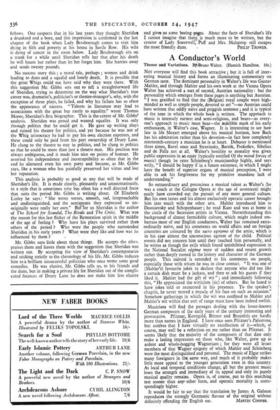A Conductor's World
Theme and Variations. By-Bruno Walter. (Hamish Hamilton. 16s.) NOT everyone will find this book attractive ; but it is full of inter- esting musical history and forms an illuminating commentary on German taste. The dominant personality in Walter's life was Gustav Mahler' and through Mahler and his own work at the Vienna Opera Walter has achieved a sort of second, Austrian nationality : but the personality which emerges from these pages is anything but Austrian. " I was gratified to find that the (Belgian) royal couple were high- minded as well as simple people, devoted to art "—no Austrian could have written that oddly naive and priggish sentence, and it is typical of the tone in which the *hole book is written. 1The apprOach to music is intensely earnest and semi-religious, and bears—as every- one's approach to music must bear—the indelible mark of his early enthusiasm, in Walter's case, Wagner. It is interesting to see how late in life Mozart emerged above his musical horizon, how Bach has his admiration rather than his devotion—in fact how completely nineteenth-century a musician he is at heart. Debussy is mentioned three times, Ravel once and Stravinsky, Bartok, Prokofiev, Sibelius and de Palk not at all. Walter's hostility to atonality was given public expression in an essay (typically entitled Of the moral forces of music) though he rates Schonberg's musicianship highly, and says wrily, " I should be happy if in a future existence, in which I might have the benefit of superior organs of musical perception, I were able to ask his forgiveness for my primitive mundane lack of understanding."
So extraordinary and precocious a musical talent as Walter's (he was a coach at the Cologne Opera at the age of seventeen) might easily have crowded out the pursuit of any more general culture. But his own tastes and his almost exclusively operatic career brought him into touch with the other arts. Mahler introduced him to Dostoievsky and Schopenhauer ; he read Kant and was at home in the circle of the Secession artists in Vienna. Notwithstanding this background of almost formidable culture, which might indeed em- barrass most of our English conductors, Walter has remained extra- ordinarily naive, and his comments on world affairs and on foreign countries are coloured by the sacro egoismo of the artist, which is in his case almost the unconscious egoism of the child. Political events did not concern him until they touched him personally, and he writes as though the evils which found uninhibited expression in the National Socialist regime were of sudden and recent growth rather than deeply rooted in the history and character of the German people. This naiveté is extended to his comments on people, especially those with whom he was in close contact. " It was one of (Mahler's) favourite jokes to declare that anyone who did not like a certain dish must be a jackass, and then to ask his guests if they liked it. Mahler had the gift of wit " ; and immediately following this, " He appreciated the witticism (sic) of others. But he hated to have jokes told or recounted in his presence. To the speaker's chagrin, he never moved a muscle of his face on such an occasion." Somehow' gatherings in which the wit was confined to Mahler and Mahler's wit within that sort of range must have been indeed owlish.
Musicians will find the passages dealing with the lesser-known German composers of the early years of the century interesting and provocative. Pfitzner,,Korngold, Bittner and Braunfels are hardly more than names in Elgland. I have once seen Pfitzner's Palestrina, but confess that I have virtually no recollection of it—which, of course, may well be a reflection on me rather than on Pfitzner. It seems likely that the majority of the composers of that date only make a lasting impression on those who, like Walter, grew up as ardent and whole-hogging Wagnerians ; for they were all lesser members of that Wagner epigony of which Mahler and Schonberg were the most distinguished and personal. The music of Elgar strikes many foreigners in thlk same way, and much of it probably makes little more appeal to the younger generation even in this country. As local and temporal conditions change, all but the greatest music loses the strength and immediacy of its appeal and only its purely musical quality remains. Opera is, of course, put to this searching test sooner than any* other form, and operatic mortality is corre- spondingly higher.
It would be fair to say that the translation by James A. Galston reproduces the strongly Germanic flavour of the original without
definitely offending the English ear. MARTIN COOPER.
































 Previous page
Previous page